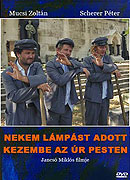
Rendező:
Miklós JancsóOperatőr:
Ferenc GrunwalskyZeneszerző:
György FerencziSzereplők:
Zoltán Mucsi, Péter Scherer, József Szarvas, Miklós Jancsó, Gyula Hernádi, Jácint Juhász, Zsolt Anger, Andrea Ladányi, Zsolt Kovács, Éva Bakos (több)Tartalmak(1)
A film Jancsó Miklós filmrendező saját apoteózisát mutatja be: Háromszoros rituális halállal (fegyver, tűz és víz által) nyeri el a beavatott, örökkévaló státuszát. Elhelyezi önmagát a Magyar Nemzeti Pantheon első helyén, szimbolikusan letaszítva "trónjáról" Kossuth Lajost, a legnagyobb magyar konszenzus birtokosát. Kossuth Lajos a film szerint fasiszta, mert Adolf Hitler verseit olvassa. Ezzel nyer indoklást az ő trónfosztása, ami vizuálisan azáltal valósul meg, hogy a produkció stábja a film végén egy sörözésre elfoglalja a lecsupaszított síremlékét a Fiumei úti sírkertben. Az ítéletet Jancsó Miklós azzal pecsételi meg, hogy tüntetően koccint egy korsó sörrel a 13 aradi vértanú emlékére. A történetben az újgazdagok partikon megszik a lelőtt családtagjaik húsát. Jancsó Miklós egyetértően hallhatja a mindent tagadó, trágáran reppelő Ganxta Zoleet. A rendező első számú rezonőre, Kapa közli - aki szintén háromszori halál által nyeri el a beavatott státuszát -, hogy ő bármit megtehet, akár embert is ölhet, mert őt is megölték, és különben is neki lámpást adott kezébe az Úr. (Budapest Film)
(több)Recenziók (1)
Truly postmodern and even more post-socialist morality, both in terms of its content and form: the fluid blending of character identities seems to emphasize the emptiness of the new life reality, which, with a wave of the magic wand of the tailor's scissors, suddenly transforms into a lifeless reality of mindless careerism, where life and death hold no greater meaning than the world itself, and thus it is irrelevant whether a character dies or comes back to life. The economic transformation that creates the rich people, killing everyone else on their way up, especially themselves as their past existences, only leads again to a loop of new personal wandering circles of reincarnation, from gravedigger to millionaire and from millionaire to gravedigger, because there is no way out for the world anymore. Jancsó, not only through his metafictional self-insertion into grotesque roles but also with the intentional sociological lifelessness of the characters, reminds us of Godard at the time.
()